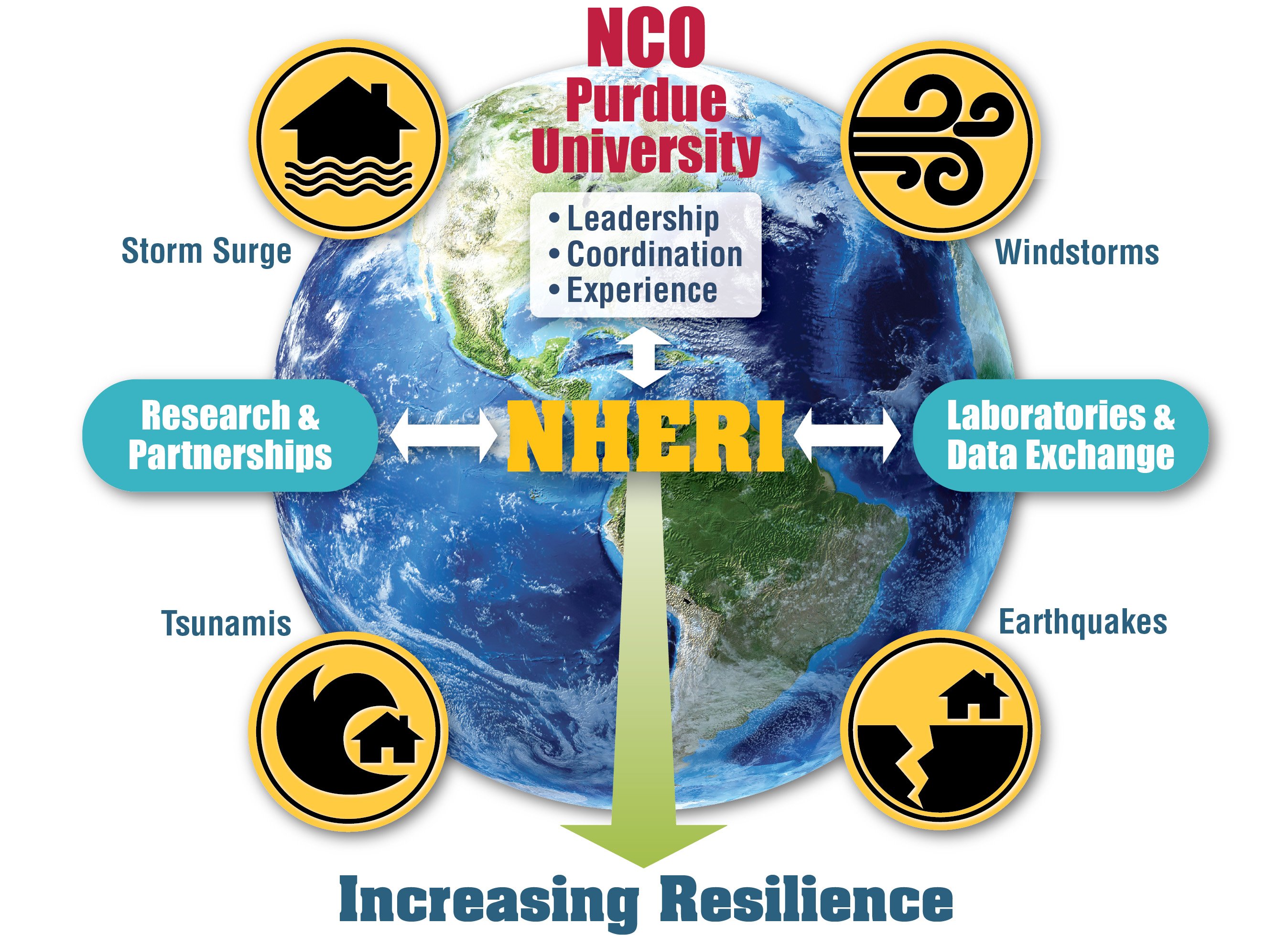Purdue University team named as recipient of the Network Coordination Office (NCO)
A Letter from NCO Director Julio A. Ramirez
Published on July 20, 2016

Dear Members of the NHERI Community,
On July 1, 2016 the Purdue University led team was officially named as the recipient of the Network Coordination Office (NCO) for the NSF-sponsored Natural Hazards Engineering Research Infrastructure (NHERI). More information about the five year award can be found at the following link from the NSF website: Award #1612144.
The Natural Hazards Engineering Research Infrastructure (NHERI) is supported by the National Science Foundation (NSF) as a distributed, multi-user national facility that will provide the natural hazards research community with access to research infrastructure. NHERI will be comprised of separate research infrastructure awards for a Network Coordination Office (NCO), Cyberinfrastructure, Computational Modeling and Simulation Center, and Experimental Facilities, including a post-disaster, rapid response research facility (RAPID). Information about the unique capabilities of these facilities can be found at: DesignSafe-CI Experimental Facilities.
Awards made for NHERI will contribute to NSF's role in the National Earthquake Hazards Reduction Program (NEHRP) and the National Windstorm Impact Reduction Program. The mission of NHERI is to provide the earthquake, wind, coastal engineering and social sciences communities with access to research infrastructure and education and community outreach activities focused on improving the resilience and sustainability of the civil infrastructure against earthquakes, windstorms and associated natural events such as tsunami and storm surge in coastal areas.
This Purdue-led Network Coordination Office (NCO) center will (a) serve as a focal point and leader of a multi-hazards research community focused on mitigating the impact of future earthquakes and windstorms, and related hazards such as tsunamis and storm surge on our nation's physical civil infrastructure; (b) lead education and outreach activities; (c) work with our partner NHERI Experimental Facilities to ensure the efficient testing and user support within a totally safe environment. We will centrally coordinate the schedule and facilitate shared technical knowledge and best practices among the Experimental Facilities; and (d) develop strategic national and international partnerships and coordinate NHERI activities with the other awardee components to form a cohesive and fully integrated global natural hazards engineering research infrastructure that fosters collaboration in new ways.
We are taking this opportunity to introduce our team, summarize our key planned activities in Year-1 of the award that involve the community and to invite you to participate and contribute so that together we can achieve the vision for NHERI.
The NCO Team
Professor Julio Ramirez, an expert in earthquake engineering and Chief Officer of the George E. Brown Jr., Network for Earthquake Engineering Simulation (NEES) from 2009 to 2015, leads the NCO team. He is joined on the team by Purdue faculty Professor Antonio Bobet from civil engineering who brings extensive geotechnical engineering expertise, and Professor David R. Johnson from industrial engineering and political science who applies interdisciplinary methods and cutting-edge scientific research to inform policy making. The team is partnering with co-principal investigators Dean JoAnn Browning of the University of Texas at San Antonio, with great experience as a researcher and administrator, a strong commitment to student success and expertise in structural engineering, earthquake engineering, engineering materials, and reinforced concrete design and analysis; Professor Billy L. Edge of North Carolina State University, a coastal engineering expert with extensive experience with mitigating tsunami and storm surge impacts; and Professor Delong Zuo of Texas Tech University, an expert in structural dynamics and wind loads on structures. Additional key senior personnel are practicing earthquake engineer William Holmes with extensive experience in development of codes and guidelines; architect Thomas Smith with expertise in windstorm damage; Dr. Cheryl Ann Blain a research oceanographer of the Naval Research Laboratory, Oceanography Division, a recognized leader in the application of numerical models based on unstructured grids to coastal dynamics, with notable expertise in numerical tide and storm surge modeling; and Professor Ian Robertson from the University of Hawaii, Manoa, who is a leading expert in tsunami and coastal engineering research.
Plans for Year-1
In the first year of the award the NCO is charged with leading the nations multi-hazards community in the development of the five-year research agenda that will elucidate grand challenges, key questions, and research objectives for earthquake, wind, coastal engineering and social sciences communities. We envision the five-Year NHERI Science Plan being developed in two steps. As required in the NHERI solicitation, as soon as all NHERI components have been awarded, we will convene the NHERI Council and collect all awardee Science Plan components and establish a task group to develop the first draft in the first three months of the award starting July 1, 2016. The entire process will be community-driven by collecting broad input and ideas from a number of stakeholders and engaging recognized leaders in the earthquake, wind, coastal engineering fields and the social sciences in the task group to synthesize that input into a comprehensive plan. In October of this year, we intend to make the first draft of the plan available to the other two governance groups of NHERI, the Network Independent Advisory Committee (NIAC) and the User Forum, as these groups are brought on-line for review and comment. We envision the first draft of the science plan ready for public comment around March of 2017. At the end of a four-week public review process, comments will be organized and addressed by the task group prior to publishing the first NHERI Science Plan on the NHERI website (designsafe-ci.org). We will be proactive in the process of gathering input from the community using a combination of collection techniques including the NEHRI cyberinfrastructure (web survey and discussion board), targeted questions to facility personnel and researchers, and interviews of code and standards-writing agencies and practitioners. With this process, we will be ready to post the plan on the NHERI website by June 30th 2017 to serve as a resource for the community as it develops research and education proposals for submission to NSF funding opportunities.
Key activities involving the community participation as described in the previous paragraph include the Science Plan development, and in the governance by responding positively to invitations to serve on the NHERI NIAC and in the population of the User Forum. This latter group will bring the input of the community into our operations, assess the effectiveness of the support to the users, and contribute to the NCO and NHERI efforts to build a community of satisfied and engaged users while recognizing the volunteer nature of the group. The User Forum will also be extremely valuable for technology transfer, dissemination of impact, and sharing lessons learned and experiences of the various hazard communities. As required by the NHERI solicitation, the User Forum will be populated with representatives from the broad scientific and engineering communities served by NHERI, elected by the user community. As prescribed in the NHERI solicitation, the NIAC will be populated with input from the Council of awardees. This committees distinguished membership will encompass the areas of activity of NHERI so that the community is properly represented in this important governance committee.
Multiple other avenues for community participation will be available through the various NHERI-wide education and community outreach activities led by the NCO. For example, the Research Experience for Undergraduates (REU) program, Summer Institute for early career faculty and practicing engineers and architects, graduate students, and K-12 teachers, and NCO committees such as the Scheduling Committee, Education and Community Outreach Committee and others. We are excited about the opportunities before us and look forward to listening to your needs and working with you to achieve the NHERI vision of global research infrastructure where users are empowered to achieve enhanced national resilience and sustainability of civil infrastructure with fewer fatalities, less interruption to societal functions, and reduced economic loss by reducing the impact of earthquakes, windstorms and associated natural hazards such as tsunami and storm surge.
Best regards,
On behalf of the NCO Team
Prof. Julio A. Ramirez, PI and NCO Director
cc: Prof. Antonio Bobet, Dean JoAnn Browning, Prof. Billy L. Edge, and Prof. Delong Zuo, Co-PIs







